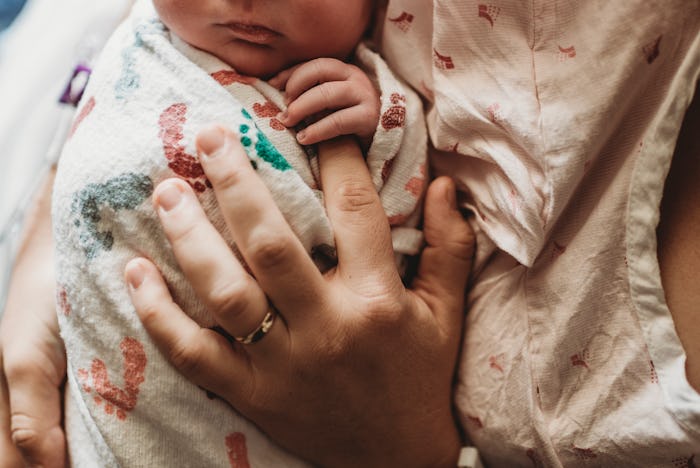News

CDC Recommends Separating Moms With Coronavirus From Newborns To Prevent Spread
While public health officials continue to research the virus that causes COVID-19, such as how it may affect pregnant women and newborns, the Centers for Disease Control and Prevention (CDC) has updated its guidelines for health care facilities providing obstetric care. The CDC is now recommending that mothers who are infected with the coronavirus be temporarily separated from their newborns to prevent the spread of the disease.
According to the CDC's guidance, it's currently "unknown whether newborns with COVID-19 are at increased risk for severe complications" and newborns coming in contact with "infectious respiratory secretions is a concern." COVID-19 is typically spread through respiratory droplets, such as from a cough or sneeze.
As such, the CDC says that to reduce the risk of transmitting COVID-19 to newborns, "facilities should consider temporarily separating (e.g., separate rooms) the mother who has confirmed COVID-19 or is a PUI [person under investigation] from her baby until the mother’s transmission-based precautions are discontinued."
The American College of Obstetricians and Gynecologists (ACOG) has backed up this recommendation, noting that while more research into the novel coronavirus needs to be done, "pregnant women are known to be at greater risk of severe morbidity and mortality from other respiratory infections such as influenza and SARS-CoV." Because of this, the ACOG says that "pregnant women should be considered an at-risk population for COVID-19."
Hospitals are being asked to discuss separation options with mothers infected with COVID-19 and inform them of the risks and benefits of the separation, which would last between 72 hours or 14 days depending on whether the symptoms are especially severe, USA Today reported.
These measures are being put into place to protect both fragile newborns and mothers, particularly since the potential adverse effects of the coronavirus are still something of a mystery to health care practitioners. "It’s hard to completely say exactly what the clinical course would be for a pregnant woman," Dr. Amesh Adalja, an infectious disease physician from Johns Hopkins University Center, explained to TODAY Parents. "We do know in general with respiratory infections that pregnant women are at increased risk for having more severe cases."
If you think you’re showing symptoms of coronavirus, which include fever, shortness of breath, and cough, call your doctor before going to get tested. If you’re anxious about the virus’s spread in your community, visit the CDC for up-to-date information and resources, or seek out mental health support. You can find all of Romper’s parents + coronavirus coverage here, and Bustle’s constantly updated, general “what to know about coronavirus” here.